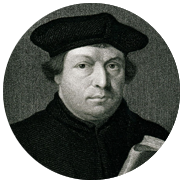A Hard Word for Blockheads & Preachers
- Martin Luther

- Nov 1, 2025
- 3 min read

These words are blows and thrusts for the false apostles and preachers. Paul is mortal enemy to the blockheads who make great boast, pretending to what they do not possess and to what they cannot do; who boast of having the Spirit in great measure; who are ready to counsel and aid the whole world; who pride themselves on the ability to invent something new. It is to be a surpassingly precious and heavenly thing they are to spin out of their heads, as the dreams of pope and monks have been in time past.
“We do not so,” says Paul. “We rely not upon ourselves or our wisdom and ability. We preach not what we have ourselves invented. But this is our boast and trust in Christ before God, that we have made of you a divine epistle; have written upon your hearts, not our thoughts, but the Word of God. We are not, however, glorifying our own power, but the works and the power of him who has called and equipped us for such an office; from whom proceeds all you have heard and believed. (2 Cor. 3)
It is a glory which every preacher may claim, to be able to say with full confidence of heart:
“This trust have I toward God in Christ, that what I teach and preach is truly the Word of God.”
Likewise, when he performs other official duties in the Church—baptizes a child, absolves and comforts a sinner—it must be done in the same firm conviction that such is the command of Christ.
He who would teach and exercise authority in the Church without this glory, “it is profitable for him,” as Christ says (Mt. 18:6), “that a great millstone should be hanged about his neck, and that he should be sunk in the depths of the sea.” For the devil’s lies he preaches, and death is what he effects. Our Papists, in time past, after much and long-continued teaching, after many inventions and works whereby they hoped to be saved, nevertheless always doubted in heart and mind whether or no they had pleased God. The teaching and works of all heretics and seditious spirits certainly do not bespeak for them trust in Christ; their own glory is the object of their teaching, and the homage and praise of the people is the goal of their desire. “Not that we are sufficient of ourselves, to account anything as from ourselves.”
As said before, this is spoken in denunciation of the false spirits who believe that by reason of eminent equipment of special creation and election, they are called to come to the rescue of the people, expecting wonders from whatever they say and do.
Now, we know ourselves to be of the same clay whereof they are made; indeed, we perhaps have the greater call from God: yet we cannot boast of being capable of ourselves to advise or aid men. We cannot even originate an idea calculated to give help. And when it comes to the knowledge of how one may stand before God and attain to eternal life, that is truly not to be achieved by our work or power, nor to originate in our brain. In other things, those pertaining to this temporal life, you may glory in what You know, you may advance the teachings of reason, you may invent ideas of your own; for example: how to make shoes or clothes, how to govern a household, how to manage a herd. In such things exercise your mind to the best of your ability. Cloth or leather of this sort will permit itself to be stretched and cut according to the good pleasure of the tailor or shoemaker. But in spiritual matters, human reasoning certainly is not in order; other intelligence, other skill and power, are requisite here—something to be granted by God himself and revealed through his Word.
What mortal has ever discovered or fathomed the truth that the three persons in the eternal divine essence are one God; that the second person, the Son of God, was obliged to become man, born of a virgin; and that no way of life could be opened for us, save through his crucifixion? Such truth never would have been heard nor preached, would never in all eternity have been published, learned and believed, had not God himself revealed it.
For what we proclaim is not ourselves, but Jesus Christ as Lord, with ourselves as your servants for Jesus’ sake.
2 Corinthians 4:5

Excerpt pulled from Martin Luther's TRUE PREACHERS COMMISSIONED BY GOD in 1522. (1483—1546) Martin Luther was a German monk in the Catholic Church who began the Protestant Reformation with the publication of his Ninety-Five Theses on October 31, 1517.








Comments